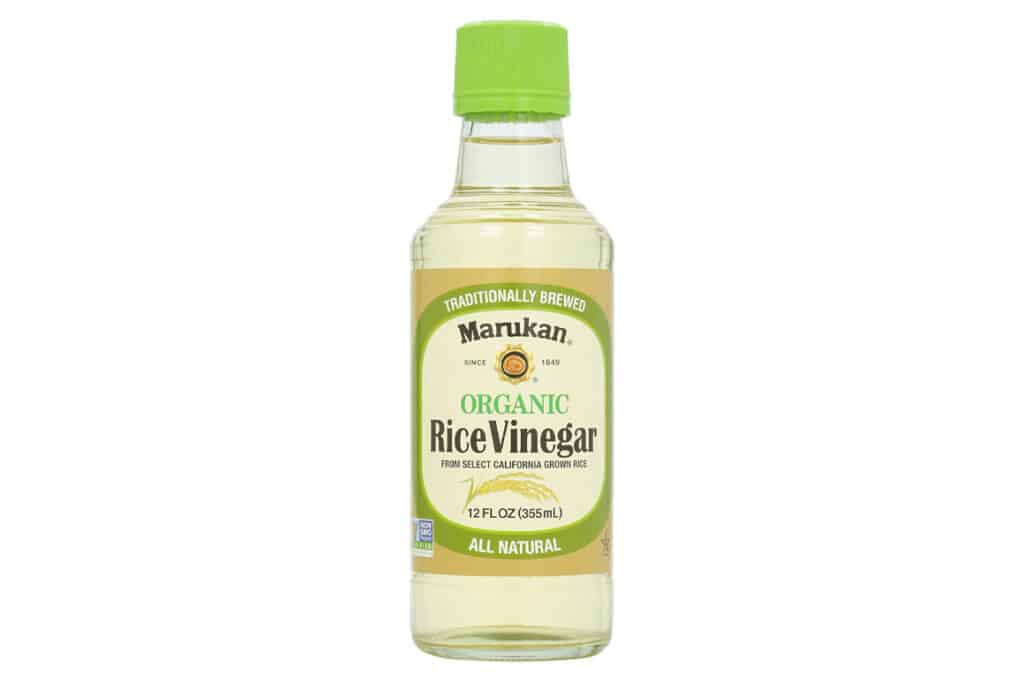Don’t fret if you don’t have sake in your pantry or can’t find it in your local grocery store! You are bound to have at least a couple of sake substitutions waiting for you to use right in your kitchen. Try out these different sake substitutions and see what you like best.
This post’s eight best sake substitutes include Chinese rice wine, rice wine vinegar, mirin, kombucha, white wine, dry vermouth, and distilled white vinegar.

This post may contain affiliate links. Please read my disclaimer.
Don’t fret if you don’t have sake in your pantry or can’t find it in your local grocery store! You are bound to have at least a couple of sake substitutions waiting for you to use right in your kitchen. Try out these different sake substitutions and see what you like best.
This post’s eight best sake substitutes include Chinese rice wine, rice wine vinegar, mirin, kombucha, white wine, dry vermouth, and distilled white vinegar.
Cooking sake is lower in alcohol content than regular drinking sake. As a result, it has a more concentrated, salty flavor that brings out the dish’s flavors.
Sake tends to have a sweet and savory taste once cooked, and it will help balance out bolder flavors.
This makes it an excellent and necessary addition to many marinades and Asian styled-cooking. Give a few of these sake substitutions a try if you ever find yourself without sake!

Related:
8 Best Sake Substitutions
1. Chinese Rice Wine (or Shaoxing Wine)

Since sake is an alcoholic beverage made by fermenting rice, there is no doubt that Chinese rice wine would be an excellent sake substitution.
Chinese rice wine, or Shaoxing wine, is a Chinese cooking wine that gives dishes a sweet and mild taste.
It is mainly used to reduce fishy taste and can be used with many seafood dishes.
Although sake and Chinese Rice Wine are both made from fermented rice, they don’t taste like rice when cooked.
You can purchase Chinese rice wine in the international section of your grocery store or at a local Asian Grocery store.
2. Rice Wine Vinegar and Water

Many people confuse rice wine vinegar and rice wine, but they can be used similarly in cooking.
For example, you can use rice wine vinegar as a substitute for sake by mixing 1 tablespoon of vinegar with 3 tablespoons of water in place of ¼ cup of sake.
Like sake, rice wine vinegar is also made from fermented rice, so it has a very similar flavor profile.
The similar tastes and notes of sweetness make rice wine vinegar a fantastic sake substitution.
Although alcohol is common in many recipes to enhance flavors, substitutes such as rice wine vinegar are just as flavorful!
Rice wine vinegar and water are also the perfect non-alcoholic alternative since it tastes sweet, acidic and savory-like sake.
3. Dry Sherry Cooking Wine

Dry sherry is a white wine that is sharp, dry, and slightly sweet. It is a fortified wine with added alcohol even after the fermentation process.
Even a little bit of dry sherry in your dish goes a long way. Dry sherry is made when the fermentation process is complete, making it less sweet since it doesn’t have the sugar from grape juice.
The slightly nutty and sweet flavor that comes out after dry sherry has been cooked is similar to sake. Dry sherry cooking wine can be found in all local grocery stores.
4. Mirin

One seemingly obvious sake substitution is mirin, the other Japanese rice wine. Mirin has a similar taste to sake, but it is slightly sweeter and has less alcohol.
Most mirin is refined-sugar-free since the sweetness comes from the natural formation of carbohydrates during fermentation.
However, a few more prominent brands, such as Kikkoman, will have their own version of “aji-mirin,” which is not mirin but tastes like mirin.
Aji-mirin is synthetic mirin that tends to have added sweeteners, so make sure to find pure mirin if you do not consume refined sugars.
5. Kombucha

Kombucha is an excellent sake substitution if you are looking for an acidic and non-alcoholic alternative. It’s a fermented and carbonated tea that can be added to dishes for additional flavor.
This popular drink is commonly consumed for its health benefits, and it has plenty of probiotics and antioxidants.
Even though kombucha is considered a non-alcohol alternative, it still has a small percentage of alcohol, making it taste similar to sake when cooked.
Most kombucha has less than 0.05% of alcohol. Still, suppose you want a completely alcohol-free alternative. In that case, you may want to use white wine vinegar or distilled white vinegar.
6. White Wine

White wine is easy to find in your local grocery store, and it has a similar flavor profile to sake! A dry white wine adds sweetness to dishes and gives them the aroma of cooked alcohol.
Like sake, the alcohol in white wine evaporates while cooking, leaving the flavors of the wine and evaporating the alcohol. This means you cannot get drunk off of cooked white wine.
Also, since white wine is made from grapes, it is gluten-free. The best white whites for cooking are pinot grigio, sauvignon blanc, and pinot blanc.
7. Dry Vermouth

Dry vermouth is a fortified white wine with herbs and woody flavors. These unique flavors are different from sake but can also work with the dish you are making.
So, make sure you understand what cooked dry vermouth tastes like before substituting it for sake.
Also, although dry vermouth is a popular alternative to sake, don’t use sweet vermouth (Italian vermouth) since it will change the dish’s sweetness.
8. Distilled White Vinegar

Suppose you simply need a mild-tasting liquid to help the consistency of the recipe while adding a mild acidity.
In that case, distilled white vinegar is the perfect solution. It has a mild flavor compared to other kinds of vinegar, and it can brighten up dishes with a hint of fruitiness.
In addition, distilled white vinegar is gluten-free and non-alcoholic, making it an excellent substitute for those with dietary restrictions. Using a small amount of distilled white vinegar can go a long way, so be sure to mix it with water.
The Takeaway
Sake is an alcoholic beverage commonly used in recipes to marinate meat and enhance the flavors of specific dishes. It is mildly sweet, salty, and has a slight hint of acidity. Although sake is uniquely flavored alcohol, plenty of substitutes can be used if unavailable. Try out one of the mentioned substitutes, and let me know which you like best!

